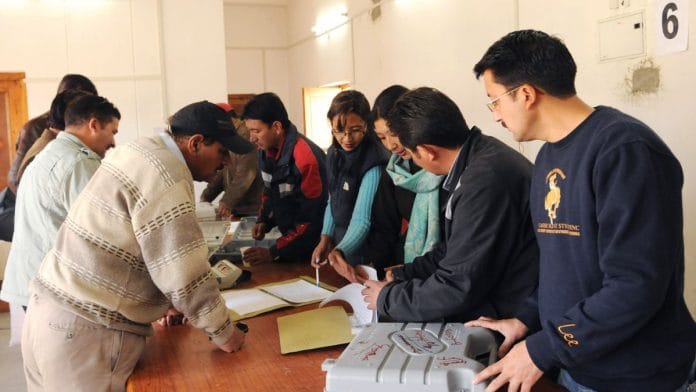New Delhi: Should voters be allowed to exercise their right to vote for NOTA (None of the Above) even in situations where there is an unopposed candidate in a constituency? The Supreme Court Monday agreed to look into this question as it issued a notice to the Centre and the Election Commission of India (ECI) based on a petition to direct the national poll body to not declare an unopposed candidate the winner without holding elections.
Filed by a New Delhi-based legal advocacy group, Vidhi Centre for Legal Policy, the petition wants the court to either read down section 53(2) of the Representation of the People (RP) Act, 1951 or declare it unconstitutional. Section 53, which applies to both direct and indirect elections, lays down a procedure for declaration of results in contested and uncontested elections.
According to Vidhi’s petition, filed by advocate Harsh Parashar, the consequent act of not conducting a poll completely prevents voters from choosing NOTA, thereby not giving them the chance to express their dissatisfaction, if any, with the contesting candidate. This, the petition says, is an infringement of a voter’s right to free speech and expression, which includes the right to reject a candidate contesting the elections.
This right, it said, was recognised in a 2013 judgment of the Supreme Court, which held that the right to cast a negative vote by choosing the NOTA option on an electronic voting machine (EVM) is protected under Article 19 of the Constitution.
According to Vidhi’s submissions, the ECI or state commissions should not declare unopposed candidates winners without holding elections. This is the second petition this year with the aim of addressing a larger debate on NOTA and its applicability.
In April, the top court had agreed to hear motivational speaker Shiv Khera’s petition, which demands that NOTA be declared a fictional candidate and rules be framed to conduct a re-election in the parliamentary seat where NOTA gets a majority.
Vidhi’s petition, however, does not ask for a re-election in case NOTA gets more votes compared to the only candidate in the constituency. It seeks to bring more transparency to the election process and also keep a check against the practice of undue pressure or extra-legal means adopted to suppress a contesting candidate or force them to withdraw.
The law under challenge
The RP Act, 1951 outlines the procedure to conduct elections to Parliament and state assemblies, the qualifications and disqualifications for membership to the Houses, what constitutes corrupt practices and other offences in connection with such elections, and the determination in case of disputes.
Section 53(2) of the Act says that if the number of candidates in a constituency is equal to the number of seats to be filled, the returning officer shall forthwith declare all such candidates to be elected to fill those seats. This means the election commission need not hold an election for such seats.
Section 53(3) deals with situations where the number of candidates is less than number of seats. It allows the returning officer to forthwith declare all candidates to be elected, after which elections can be held to the remaining seats.
In furtherance of this law, the ECI has framed Rule 11 under the Conduct of Election Rules, 1961, which instructs the returning officer to declare an unopposed candidate to be elected by filling a form and sending it to an appropriate authority and the chief electoral officer. The handbook for returning officers affirms this rule to say that in case there is only one candidate for a seat, that candidate will be automatically declared elected.
Violation of freedom of speech
According to Vidhi’s petition, the right to cast a negative vote is an intrinsic part of the fundamental right to free speech and expression, as was declared in 2013 by the top court. In People’s Union for Civil Liberties vs Union of India, the apex court had held that the right of a voter to cast a negative vote in an election by pressing NOTA on an EVM is part of their fundamental right to free speech and expression.
Five years after that, the apex court clarified that this right extends only to direct elections—to Parliament and state legislative assemblies and not to indirect ones, which are elections to the council of states and state legislative councils.
In its present form, Section 53(2) defeats the right of voters to cast a neutral or negative vote. The curtailment was not legitimate as it did not fall under any of the grounds under Article 19(2) that permits the state to impose reasonable restrictions on its citizens. Therefore, the petition termed the provision as arbitrary and excessive, and one that invades the fundamental right of a voter.
Violation of Article 14
Section 53(2) also creates an unreasonable classification among voters which, Vidhi’s petition says, is arbitrary. It distinguishes between two classes of voters in a direct election. One class of voters is part of the constituency where the number of candidates is more than the number of seats to be filled and the second class is where the number of candidates is equal to the number of seats to be filled.
While both categories of voters enjoy the same right—to free speech and express their views—and go through the same enrolment procedure, they get differentiated on account of Section 53(2). Such a division is not reasonable and there is no intelligible reason behind it, Vidhi has submitted.
Efficient economic utilisation of national resources appears to be the evident purpose behind the law, Vidhi’s petition says. But in view of a 2008 Supreme Court judgment, it adds, financial considerations should not outweigh fundamental rights guaranteed by the Constitution of India.
(Edited by Radifah Kabir)
Also Read: Man who ‘impregnated minor’ allowed bail & ordered to marry her post-release. What Allahabad HC said






